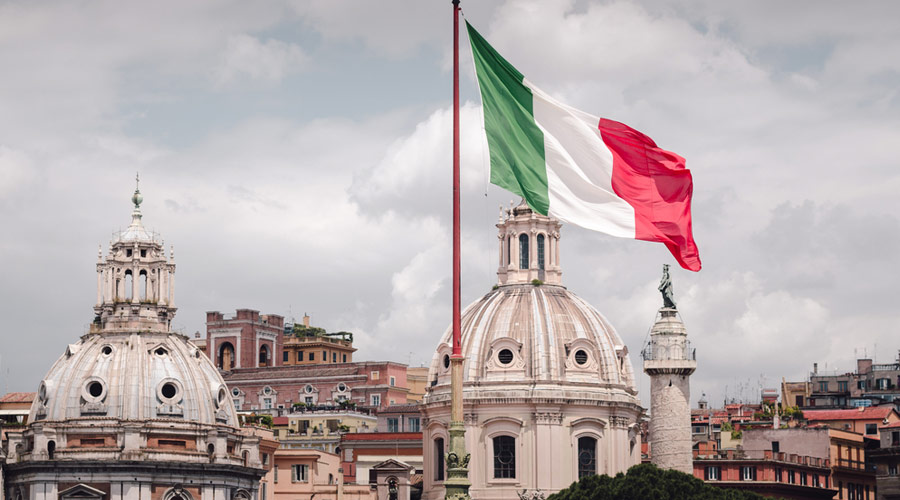Giorgia Meloni looks set to become Italy's first woman prime minister at the head of its most right-wing government since World War Two after leading a conservative alliance to triumph at Sunday's election.
Provisional results showed the rightist bloc should have a strong majority in both houses of Parliament, potentially giving Italy a rare chance of political stability after years of upheaval and fragile coalitions.
There is not yet a definitive breakdown of parliamentary seats. Definitive results are expected later on Monday.
Meloni and her allies face a daunting list of challenges, including soaring energy prices, war in Ukraine and renewed slowdown in the euro zone's third largest economy.
"We must remember that we are not at the end point, we are at the starting point. It is from tomorrow that we must prove our worth,” the 45-year-old Meloni told cheering supporters of her nationalist Brothers of Italy party early Monday morning.
Meloni plays down her party's post-fascist roots and portrays it as a mainstream group like Britain's Conservatives. She has pledged to back Western policy on Ukraine and not take risks with Italy's fragile finances.European capitals and financial markets will carefully scrutinize her early moves, given her eurosceptic past and her allies' ambivalent position on Russia.
In her victory speech, Meloni struck a conciliatory tone. ”If we are called on to govern this nation we will do it for all the Italians, with the aim of uniting the people and focusing on what unites us rather than what divides us,” she said.“This is a time for being responsible.”Brothers of Italy
Projections based on well over half the votes counted put the Brothers of Italy on almost 26%, up from just 4% in the last national election in 2018, as voters opted for a largely untried figure to sort out the nation's many problems.
By contrast, her main ally suffered a disastrous night, with Matteo Salvini's League picking up around 9% of the vote, down from more than 17% four years ago, and being overtaken by Meloni in all its traditional fiefdoms in the north.
The other major conservative party, Silvio Berlusconi's Forza Italia party, also scored around 8%, leaving Brothers of Italy the dominant partner.
Although Meloni's alliance is forecast to hold comfortable majorities in the upper and lower houses, its members have divergent positions on several issues which might be difficult to reconcile.
Alliance with divergent views
Salvini, for example, questions the West's sanctions against Russia and both he and Berlusconi have often expressed their admiration of its leader Vladimir Putin.
They also have differing views on how to deal with surging energy bills and have laid out a raft of promises, including tax cuts and pension reform, that Italy will struggle to afford.
Sarah Carlson, senior vice president of Moody's credit ratings agency, said the next Italian government will have to manage a debt burden“that is vulnerable to negative growth, funding cost, and inflation developments”.
Rome at centre of EU-policy making
Meloni will take over from Prime Minister Mario Draghi, the former head of the European Central Bank, who pushed Rome to the centre of EU policy-making during his 18-month stint in office, forging close ties with Paris and Berlin.
By contrast, among the first leaders to congratulate Meloni was Viktor Orban, the prime minister of Hungary, who has been accused by Brussels of infringing the rule of law, but is close to both Meloni and Salvini.
Despite its clearcut victory, the vote was not a ringing endorsement for the conservative alliance. Turnout was just 64% against 74% four years ago -- a record low in a country that has historically had strong voter participation.
Electoral laws
The right took full advantage of Italy's electoral law, which benefits parties that forge pre-ballot pacts. Centre-left and centrist parties failed to hook up and even though they won more votes than the conservatives, they ended up with far fewer seats.
The centre-left Democratic Party (PD) took some 19%, the left-leaning, unaligned 5-Star Movement, scored around 16%, while the centrist“Action” group was on just over 7%.
"This is a sad evening for the country,” said Debora Serracchiani, a senior PD lawmaker.“(The right) has the majority in parliament, but not in the country.”
Reuters
(Additional reporting by Angelo Amante)











